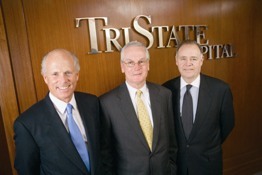Tagged: Charles C. Fawcett IV
How to Avoid Social Engineering Data Vulnerabilities
 Drawing on three decades of professional banking experience, Charles C. Fawcett IV is the president of private banking at TriState Capital. In addition to leading one of the largest private banks in Pittsburgh, Charles C. Fawcett has co-authored white papers on improving data security through mediating social engineering risks.
Drawing on three decades of professional banking experience, Charles C. Fawcett IV is the president of private banking at TriState Capital. In addition to leading one of the largest private banks in Pittsburgh, Charles C. Fawcett has co-authored white papers on improving data security through mediating social engineering risks.
Social engineering is the attempt to hack into a data system by exploiting a mistake made by a person with access. Through manipulation such as phishing emails, fraudsters try to trick unsuspecting targets into disclosing private passwords or other information. In order for companies and individuals to protect themselves from social engineering fraud, one should never release any personal financial information in response to an unsolicited call, email, or fax. Consider emails suspicious that warn of consequences, such as termination of your account, if you don’t respond immediately with private information.
Also, it’s important to review bank and credit card transactions frequently for fraudulent purchases or transactions and to report any incorrect or suspicious transactions, even if it is a small amount. Often, financial data thieves attempt small purchases first to see if the cardholder will notice.
Social Engineering Fraud Trends for 2018
As a banking professional with decades of experience in the field, TriState Capital’s Charles C. Fawcett IV is familiar with many forms of bank fraud. One area in which Charles C. Fawcett IV strives to improve financial security is social engineering hacks, which are an increasingly common problem for banks.
Social engineering attacks are often the most successful form of data breach, in part because they often prey on the desire of employees to do their jobs diligently and effectively. Due to this success, banks and other institutions can expect even more attacks along this line in the future.
One such form of attack likely to increase in 2018 is the hybrid attack, in which a conventional ransomware package is deployed and used as cover for another social engineering or ransomware deployment of greater complexity. In addition to creating chaos in which an attacker can act more effectively, these low-level attacks distract the IT and networking teams from the larger and more serious attack in progress.
Custom-made attacks are also likely to become more common. These attacks use publicly-available social media information to tailor the attack to the individual or organization targeted. Banking professionals will need further training on how to defend against all of these types of attacks in 2018.
Differences Between a Joint Venture and a Partnership
Charles C. Fawcett IV is the president of TriState Capital, a private bank located in Pittsburgh. A graduate of the University of Pittsburgh, Charles C. Fawcett IV has extensive experience in facilitating business relationships, such as joint ventures and partnerships.
Joint ventures and partnerships are two methods in which business entities can be structured. Outside of this similarity, the two entities have significant differences.
In partnerships, taxes pass to the owners in a process known as pass-through taxation. The business owners pay taxes on the business profits on their own individual tax returns. Although joint ventures may be taxed in this manner, they can also be treated as corporations depending on their specific structure and purpose.
Another difference between joint ventures and partnerships involves the liability of the owners. Members of a partnership are personally liable for the obligations of the business, while joint ventures can be structured so that members are protected from personal liability.
Finally, while partnerships are formed solely to make a profit, joint ventures are sometimes designed to achieve a specific goal. For this reason, joint ventures are typically limited in duration and can be dissolved once they achieve their purpose.
Three Things to Look For in a Merchant Services Provider
Pennsylvania finance executive Charles C. Fawcett IV serves as president of TriState Capital Bank, a private bank serving middle-market businesses and clients of wealth management firms. Under the leadership of Charles C. Fawcett IV, TriState Capital offers services in areas such as commercial real estate, investment management, and merchant services.
In the payment processing sector, merchant services providers work closely with companies that utilize credit card services. Below are three factors to consider before deciding on a merchant services provider.
1. Fees: Merchant services providers charge a wide variety of processing fees, monthly use fees, and interchange fees. By understanding their specific needs when considering fee structures, businesses can avoid unnecessary expenditures.
2. Accepted payment types: In general, companies prefer to use a credit card processor that accepts all major credit and debit cards. Anything less may require businesses to turn away customers, ultimately hurting the bottom line.
3. Customer support: Over time, every business encounters problems such as credit card machine malfunction or issues with monthly billing statements. By choosing a merchant services company with excellent customer support, businesses can avoid service delays in the future.v



You must be logged in to post a comment.